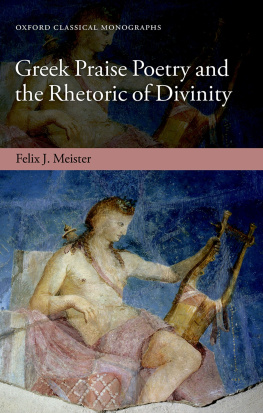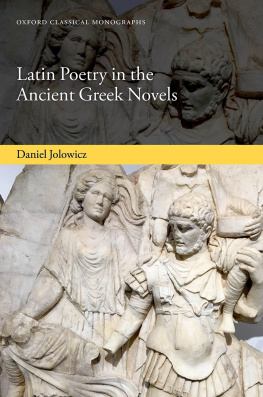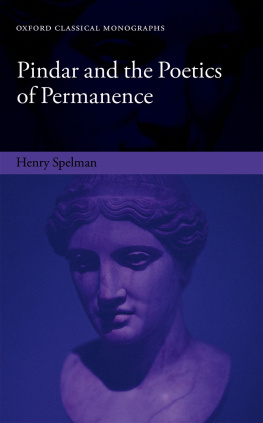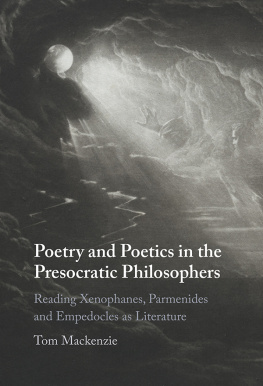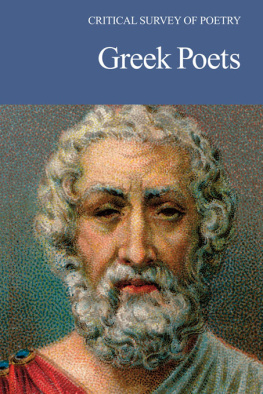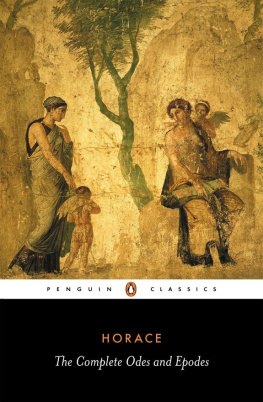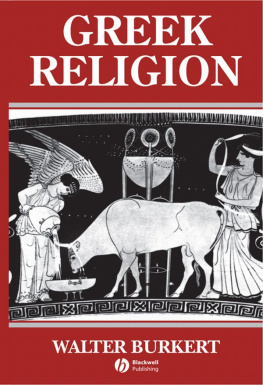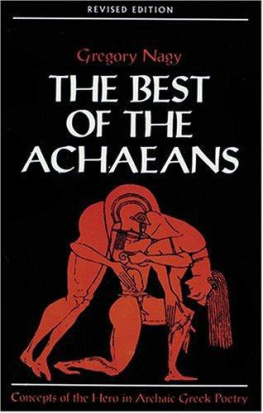This book is a revised and expanded version of my D.Phil. dissertation entitled Momentary immortality: Greek praise poetry and rhetoric of the extraordinary, which was submitted and defended at the University of Oxford in 2015. The title of this book is an attempt at toning down the apparent paradox in the original title.
In the course of writing the dissertation and rewriting it for publication as a monograph, I was privileged to receive the help of distinguished scholars, to whom I would like to express my appreciation and gratitude. Gregory Hutchinson, who supervised both my M.St. and my D.Phil. studies at Oxford, provided me with comprehensive guidance and support. He gave most generously of his knowledge, time, and patience, not only while I was in Oxford, but also after I moved to Germany for a position at the University of Cologne in 2014. Bruno Currie, who supervised the first year of my D.Phil., offered valuable help in laying the foundations of my dissertation. Scott Scullion, Armand DAngour, and William Allan assessed early versions of chapters for the transfer and confirmation of status. Their criticism prevented me from pursuing many a blind alley. In Cologne, Jan-Felix Gaertner generously accommodated the completion of my degree. The two examiners of my thesis, Felix Budelmann and Andrea Rodighiero, gave invaluable advice for the transition of the dissertation into a book, as did the anonymous reader appointed by the press. Armand DAngour supervised the transition process with great patience and expertise. As I was approaching the finishing line, Colognes emeritus Rudolf Kassel kindly agreed to read the manuscript. His rigorous method and unerring eye helped me correct various oversights.
I would also like to thank the Faculty of Classics at the University of Oxford and Wolfson College for funding my D.Phil. studies, and Wolfson and Exeter College for providing the most stimulating of environments. My work in Cologne has benefitted immensely from the thought-provoking discussions at the Doktoranden-Kolloquium convened by Rudolf Kassel and Jrgen Hammerstaedt, and from access to the excellent faculty library.
The most patient and constant source of support has been offered to me by my wife Veronica. She not only provided encouragement and stimulating conversation but also read each and every draft of every chapter of the dissertation as well as the final manuscript of the book, red pen in hand. I cannot express with words the extent of my indebtedness to her.
The last word of thanks is owed to my parents for their love and support.
F. J. M.
For the sake of convenience, references to fragments of Hesiod are by default from the edition of Reinhold Merkelbach and Martin West (Oxford 31970), those to the fragments of Sappho from Eva-Maria Voigt (Amsterdam 1971), those to the fragments of Pindar from Bruno Snell and Herwig Maehler (Leipzig 1989), those to the fragments of Aeschylus from Stephan Radt (Tragicorum Graecorum fragmenta 3, Gttingen 1985), those to the fragments of Sophocles from Stephan Radt (Tragicorum Graecorum fragmenta 4, Gttingen 1977), those to the fragments of Euripides from Richard Kannicht (Tragicorum Graecorum fragmenta 5, 2 vols, Gttingen 2004).
Translations of ancient passages are my own. Abbreviations of Greek and Latin authors and works follow the lists of A Greek-English Lexicon (ed. H. G. Liddell, R. Scott, rev. H. S. Jones, Oxford 91940) and the Oxford Latin Dictionary (ed. P. G. W. Glare, Oxford 22012) respectively, with the exception of Plutarchs Moralia, where essays are abbreviated individually, and Euripides Heracles, which is abbreviated not as HF but as Her. Abbreviations of modern journals follow the list of lanne philologique where available. In other cases, journal names are given in full.
In addition, editors, editions, and collections are referred to with the following abbreviations:
J. Boardman, Athenian Black-Figure Vases: A Handbook (London 1974).
J. D. Beazley, Attic Black-Figure Vase-Painters (Oxford 1956).
G. Ahlberg, Prothesis and Ekphora in Greek Geometric Art (Gteborg 1971).
J. Boardman, Athenian Red-Figure Vases, The Archaic Period: A Handbook (London 1975).
Epicuro: Opere, ed. G. Arrighetti (Turin 1960).
J. D. Beazley, Attic Red-Figure Vase-Painters (Oxford 21963).
)
Aeschyli Agamemnon, ed. C. J. Blomfield (London 31826).
Painted funerary plaques and some remarks on prothesis, BSA 1 (1955): 5166.
Euripidis dramata, ed. F. H. Bothe, 2 vols (Leipzig 1825/6).
Carmina Latina epigraphica, ed. F. Buecheler, 2 vols (Leipzig 1895/7).
Alcman: Fragmenta, ed. C. Calame (Rome 1983).
Euripidis Electra, ed. P. Camper (Leiden 1931).
Pindarus: Threnorum fragmenta, ed. M. Cannat Fera (Rome 1990).
Corpus christianorum: Series Latina, 201 vols (Turnhout 1953).
Pindari carmina prolegomenis et commentariis instructa, ed. W. Christ (Leipzig 1896).
Corpus inscriptionum Latinarum

